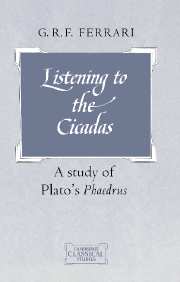Summary
This is a book about Plato's Phaedrus, nothing more; but that is quite a lot. I shall dispense with a long preamble as to its contents. Rather, my way of orienting readers to Plato's concerns in this dialogue, and to my own in writing about it, will be to take them (in my opening chapter) for an extended tour of the dialogue's scenic beauties. Like all readers of this work, we shall learn something about love, and something about rhetoric, and will consider how the two are connected. In addition, I shall have much to say about Plato's use of myth, his writing of philosophic dialogues, and his mode of psychology – topics which the dialogue strikingly exemplifies.
However, I shall not – or not often – be concerned in this book to map the position of the Phaedrus against the landmarks provided by other dialogues, nor to consider its place in Plato's philosophic development. I am out to achieve something different: to live for a while within the environment of a single dialogue; and not just to survey its acres and mend its stiles, but to sit on the grass and breathe its special atmosphere. By this means I hope to gain a better understanding of the man's philosophy – a better feel for it – at least in so far as it shows through this dialogue; and so to bring back a souvenir for others that they may think worth keeping. But readers must judge this for themselves.
- Type
- Chapter
- Information
- Listening to the CicadasA Study of Plato's Phaedrus, pp. ix - xiiPublisher: Cambridge University PressPrint publication year: 1987

